Using Herbs & Essential Oils with Your Backyard Chickens
What my chickens consume, my family consumes. That’s why I prefer to try herbals, essential oils, and natural remedies before bringing out the big guns.
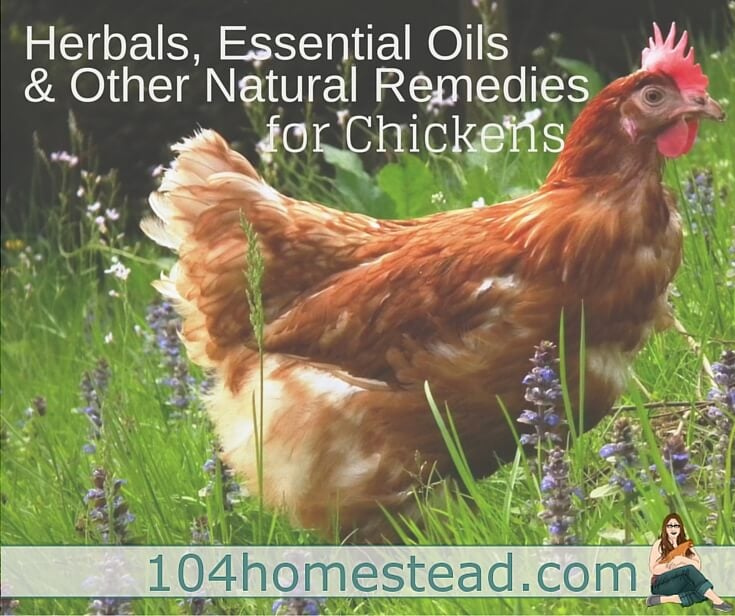
Before I begin this post, I want to reiterate something that is present on every page of this website. I am not a veterinarian. Please use common sense and do your research before using alternative remedies with your flock. When in doubt, contact an avian veterinarian before treating your birds. Click here for a great resource for finding an avian vet. The recommendations I am making are based on research and my own personal experience.
Part of the reason I raise chickens (and homestead in general) is because I care about what goes in our bodies. Between eggs and meat, what goes into my chickens goes into my family. I avoid drugs and medications with my chickens the same way I do with my family members. That’s why I prefer to at least try natural remedies first.
Herbal Alternatives for Chickens
The following herbs are great at repelling insects. They can be grown around your coop or dried and hung inside.
- Catnip
- Fennel
- Feverfew
- Lavender
- Pennyroyal
- Peppermint
- Rosemary
- Spearmint
- Tansy
Lemon Balm and Mint are great at repelling rodents. You can use them like you would the insect-repelling herbs, or you can make satchels to store in grain bins and bags.
Nest boxes can benefit from herbs as well. Dandelion, dill, lavender, lemon balm, and rose hips act as relaxants. A relaxed hen is less likely to become egg bound. Borage, comfrey, fennel, marigold, marjoram, mint, nasturtium, parsley, sage, and thyme have been long thought to increase egg production. When using herbs inside the coop, make sure they are first thoroughly dried. Moist and fresh herbs mixed in with organic bedding may cause molding.
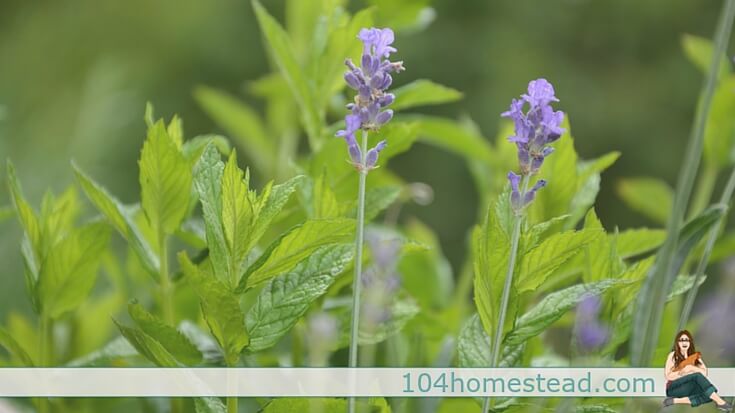
Wives tales abound regarding herbs for internal parasites, but many herbal remedies have gone untested. Hyssop, nasturtium, sage, spearmint, tansy, and thyme have commonly been fed to chickens to ward off internal parasites. I prefer to keep them separate from the feed, opposed to mixed-in, because I believe the chicken is smart enough to know what it needs and when.
Essential Oils for Chickens
Clove Oil
Clove oil diluted at 2% in a carrier oil (such as olive) can be used to prevent feather picking. This works well if your bird is picking her own feathers or if others are picking at her. Just remember, if a hen is picking her own feathers, there is most likely an underlying cause. Treat the problem before dealing with the side effect.
Cedarwood/Citronella/Lavender/Lemongrass Oils
These oils (approximately 15 drops each) when “mixed” with 16 oz water and sprayed throughout the coop can keep insects at bay. Oils won’t actually mix with water, but the water helps disburse it evenly. Because chickens have sensitive respiratory systems, it is best to spray when everyone has finished laying for the day and is out and about outside of the coop. Make sure the coop has been aired out before allowing the chickens back in.
Lavender Oil
When made into a salve with coconut oil, lavender oil is great at healing and protecting open wounds and sore. Dilute to 1% before applying and be sure to avoid the eyes, mouth, and nostrils.
Neem Oil
Neem oil disturbs the life cycle of scaly mites. Apply at a 1-2% dilution with soybean oil, linseed oil, or vegetable oil on affected chickens. Follow up with a thick coating of Vaseline.
Nutmeg Oil
Nutmeg is a natural pain reliever, but it must be used with caution when dealing with chickens. Apply it only on closed wounds and in tiny amounts (1% or less in a carrier oil). A friend of mine has used this method of pain relief with hens that have passed broken eggs and she swears by it.
Oregano Oil
I have not personally used oregano oil because I am not comfortable dosing my birds internally with essential oils, but oregano oil has been used for generations as an antibiotic/antiviral. It is commonly mixed in the chicken’s water supply. If it makes you feel more comfortable, there is a commercial product on the market called RopaPoultry Oregano Oil Supplement that comes with exact dosing instructions. In addition to oregano oil, it contains various other oils that are suppose to act as a natural antibiotic.
*** UPDATE: I have begun using 1 drop of oregano oil per serving of fermented feed and I have been happy with the results. ***
Tea Tree & Oregano Oils
Favus, is a chronic skin condition caused by fungus. It often presents itself as scaly and crusty patches on the chicken’s comb. 1% tea tree oil and 2% oregano oil in coconut oil rubbed on the affected area once or twice a day has shown to clear up favus.
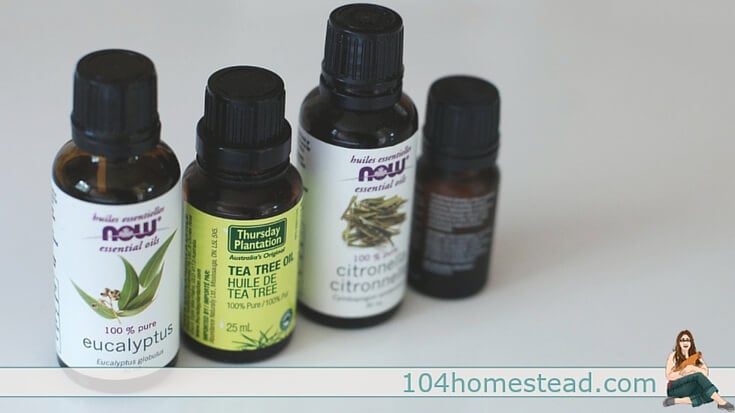
Thieves Oil
Thieves oil in an Epsom salt soak can do wonders when dealing with bumble-foot. I fill a dish pan with warm water, sprinkle in some salt, and add 3-4 drops of essential oil.
VetRx
VetRx is a commercial product that contains balsam, camphor, and rosemary in a corn oil base. It is used by natural poultry keepers to treat colds, roup, scaly mites, and eye worm. It is also helpful when battling respiratory infections.
Use caution when applying essential oils directly on your birds. NEVER apply an oil without diluting it first. ALWAYS use therapeutic-grade oils.
Other Natural Remedies for Chickens
Diarrhea? Try offering wheat bran soaked in buttermilk.
Sour crop? Withhold food and water for 24 hours. Give a tablespoon of coconut oil or olive oil via an eyedropper. Wait 12 hours and then offer scrambled egg mixed with plain yogurt.
Wry neck? Try Turmeric Tea in the same dose you would drink yourself.
Frostbite on combs and wattles? First, ventilate properly! Frostbite is easily avoided in coops with proper ventilation. If your chicken has frostbite, gently rub on a coating of coconut oil.
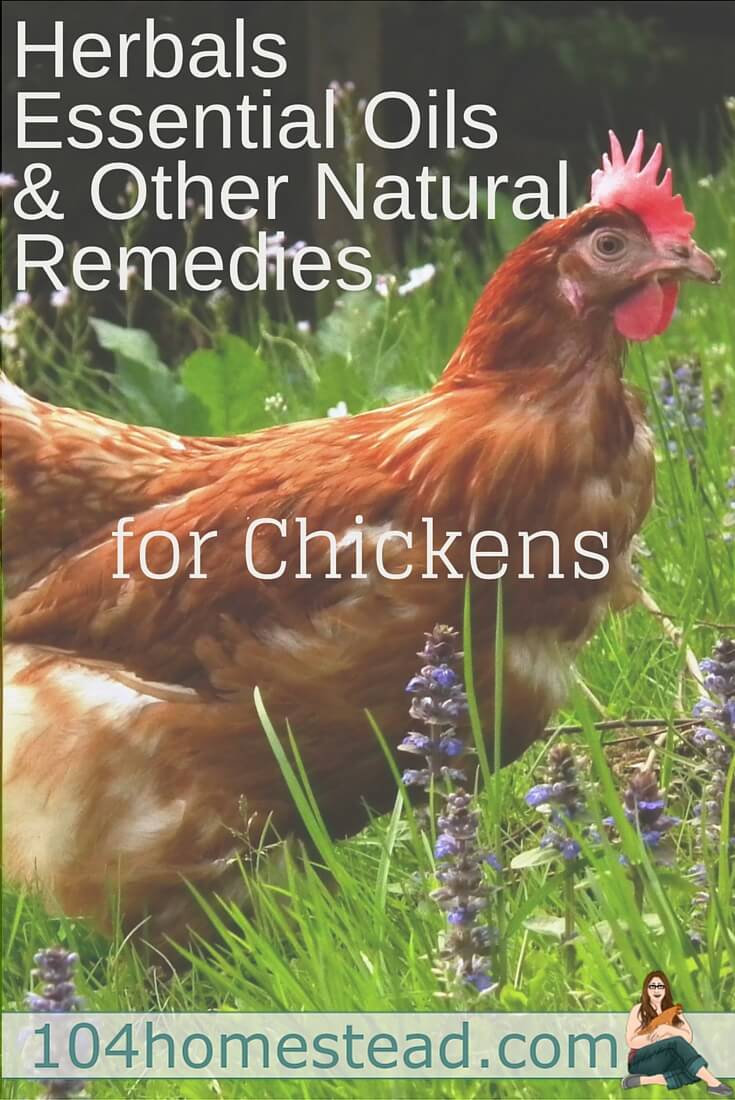
Again, consult a professional and research before taking your chickens’ health in your hands. Most natural alternatives work far better as preventatives than they do as cures. What natural remedies have worked for you and your chickens? Share in the comments below.
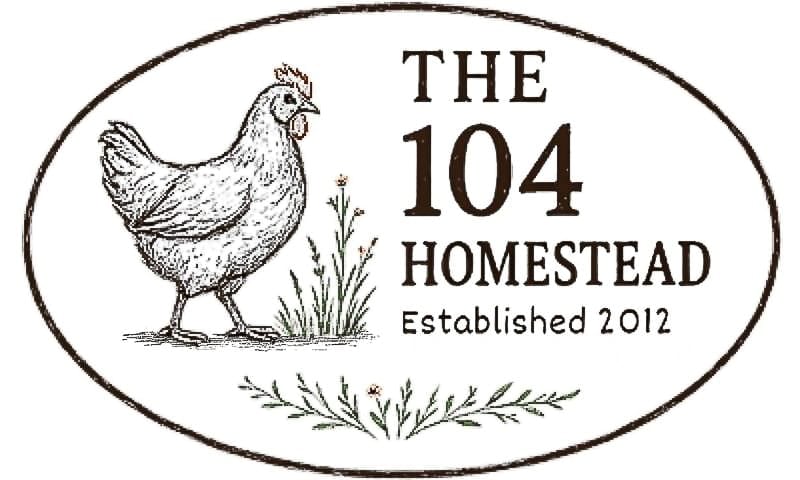
I want to know problem in backyard
Can you please recommend how to use the nutmeg for the chicken passing broken egg? I currently am dealing with this issue. Diluted topical? Where? Or internally? Or diffuse? Thank you so much for this article :).
Hi, thank you for your natural remedy recommendations! Wish your page had a print button so I could print it without all the ads, etc.
Sincerely,
Brenda
In your remedy for feather picking, do you spray this on the chicken or give it internally?
Can I get rid of the lice & mites in the coup by spaying tea tree oil ?
how do you administer thyme extract for treatment of canker in chickens thank you
My chicken is not healthy, I always try to understand the medicine for chickens. Chicken farming is my happiness.
I use and sell Young Living Essential Oils and use them on my chickens/dogs, cats and us.. Currently I am using oregano in there water for my chickens and I am about to use clove for stopping one of the chicken from plucking off the neck feathers of several other birds. I did not have this feather plucking problem until I locked them in a run… They aren’t happy about not free ranging, but I have a hawk that lives in my driveway and after a few minutes of being out starts circling and sits in a tree next to the pen. The run is plenty big (want to make it bigger). In this cold weather they stay in the coop…. One showed up through the woods to join our flock she has scaly legs so I guess I have to treat her….after I get rid of the rooster.. rehome him.
Thanks again for the article. Here are some things I do for my sixty+ free-pastured chickens:
Melrose in a spray bottle sprayed on wounds.(Never use on.
cats)
Thieves in an eyedropper forced in the beak for one or two individuals or put in their water for a group for any infections especially for respiratory infections. I have successfully rid them of resp problems in all cases but one over the years. It works in only two to four days!
Here is a study saying eucalyptus, thyme and oregano are good to reduce salmonella https://www.wattagnet.com/articles/14290-oils-in-chickens-drinking-water-may-reduce-salmonella-contamination. And I have used some on occasion but on a weekly basis, I give them home made raw-milk kefir figuring this will balance their probiotic levels instead…
And finally, a helpful hint for getting Leo’s to disperse in water or spray bottle is to put the oils in the container FIRST then add your water. HTH
Oops… Should be EO’s…not Leo’s….
Hello,our chiken is making foam on her eyes and as far as i know it is an infectious respiratory problem.I have thieves and other essentials.Can you tell me about dozage ?
What herb combination would I use to make a salve to put on inflamed skin? It’s under a rooster’s vent. Bumpy and red. No mites, no mite poo, no mites on roost. I think it’s candida.
Hi, We have red mites in our coop of two pet chickens. Tried steam cleaning, pressured water, lavendar oil in oil and about to now try oregano oil. Anyone got any other natural remedies?
Thanks.
I sprayed my coop with 2 cups water I cup vegatable oil with 15 to 20 drops of rosemary and lavender essenial oils.
Sprinkled DE and in coop and on rooster. Also spary mixture on roosting bar.
Also treated each chicken with DE.
Make sure nesting boxes are cleaned and treated also.
I also make sure there is no wet poo in coop. Also mitebegone (from Amazon) sprinkled in coop
So far I am seeing good results.
Hope this helps?
Let me know how it goes 🙂
I am wondering if there are essential oils that can be used effectively to treat chickens who have lice.
Hi PLease assist! i have Silkies and the Cock & a little Chick have their eyes closing from what seems to be a mucous?
i have tried Collidal Silver with no luck!
What can cure their eyes please?
Concerned,
David.
Vet RX. Great for infections. It is already diluted so rub all around eyes and nose.
I know that pay darco is really great for candida and I’m able to use it on my dogs. I would think it’s fine for chickens too. I also like cats claw for things like that as well as Infection and immune support. Pau darco has many uses as well. Also look into bidens pilosa also called black jack for chickens. I love it and we use it ourselves as an antibiotic combined with black pepper. Usnea australis is also really great for infection and wound care.
Look into Usnea Australis it is a medicinal lichen and I e used it for eye infections in kittens and a wound on a cat as well as myself as a systemic antibiotic. I really love it!
Can I sprinkle garlic powder in fermented feed or water? How much
My rooster’s leg joint is swollen and hot to touch. He won’t walk on it hardly at all. I don’t want to give him antibiotics. what would be a good alternative. I have essential oils and herbs.
I’d suggest a comfrey poultice if you’re rooster is placid enough to let you hold him for any length of time. You can find out how to make one here: https://theherbalacademy.com/comfrey-uses-and-remedies/
You certainly can (assuming it doesn’t have non-clumping additives). I’d eyeball about a teaspoon per 5 gallons because it’s very concentrated.
Yes. I do it once-a-month for my chickens in combination with cayenne. I am guessing I use about half a cup of each in about 2 gallons of feed. Chickens do not taste “hot.” This reminds me! I haven’t done this for two months now! Thanks for the reminder.
Yes. I do it once-a-month for my chickens in combination with cayenne. I am guessing I use about half a cup of each in about three gallons of feed. Chickens do not taste “hot.” This reminds me! I haven’t done this for two months now! Thanks for the reminder! I buy them from Frontier by the pound.
Thank you for your article. My question, we are beginning to use essential oils in our house and diffusing them for concentration specifically. What are your recommendations for using the diffuser with baby chicks in the house? We have our first set of eggs in the incubator and plan to keep the chicks in the house for a few weeks. Thanks!
I would not keep a diffuser near chicks. They have very sensitive respiratory systems and the diffusers are very harsh on their systems.
How much oregano leaf (for anti inflammatory purposes) would be a good amount to feed a duck with bumblefoot?
What would you consider not to close? A few feet away? Across the room?
Thanx
How and where would apply the clove oil if you a have healthy chick that is being pecked by another? I saw the dilution information above but now how to apply
Apply it diluted to the area being packed either via spray bottle (make sure not to get near chickens face) or just wipe it on with your hands or a cloth.
Oregano oil:
How much per gallon of water?
Just a couple of drops. It’s very strong.
I am interested in the oregano. I used Ropa B for my pigeons but was thinking of essential oil instead. You say one drop but how much feed is that being added to?
I’m not sure about exact proportions. I add 3 or 4 drops to a 1-gallon bucket of fermented feed.
how is the oil dispersed through the feed properly? If I use water it would just sit on top. Normally oils are diluted with a carrier oil… Can chickens consume olive oil? But again, how much? Obviously oregano is excellent, but also very hot and potent. I use uncompromised CPTG essential oils for my family and my health and on pets, and want to use with our chickens, but just not sure how to dilute it enough for their ingestion.
I feed my chickens EOs because I trust the quality and purity of my oils. I also ingest them myself and use them on my dogs and cats and goats with only good results. Since the FDA does not regulate them, most are adulterated and not for comsumption. I have used them in my Lyme protocol internally now for 3 years and have only good things to report so just do your research and know that all oils are not created equal. Great tips here Jessica and I will add some of these tips to my wellness arsenal!
Thank you for this!! It’s so helpful!!
You are so welcome Summer.
Really helpful thanks so much it really helped
This website was very helpful thanks so much and I was wondering u can’t eat essential oils can u?
There are some that are safe to consume, but it’s not something I am comfortable with. There are some good resources, such as Herbal Academy of New England, that can give you a better answer than I can about consuming oils.
Depends on the quality of the essential oils and which oils… doTerra and Young living you can, but they have their own scientist and doctors on staff and they do rigorous testing to make sure it’s unadulterated. 80 percent of the essential oils on the market today are adulterated, so be careful! : ) (For Example) If they say they can’t be digested and it’s an oil like peppermint, which you should be able to digest, they are definitely not an oil you want to buy.
Totally agree! Thanks
I’m currently giving herbal solutions to my chickens – garlic, ginger, neem leaf, scent leaves etc. Better and cheaper than antibiotics.
Couldn’t agree more! I just refreshed the herbs in the ladies’ nest boxes today.
Great article! Plan to use your tips.
I’m so glad I could help 🙂